in Thoreau’s Journal:

Though somewhat cool it has been remarkably pleasant today—& the sun sparkles where the river is open are very cheerful to behold.

in Thoreau’s Journal:

Though somewhat cool it has been remarkably pleasant today—& the sun sparkles where the river is open are very cheerful to behold.
in Thoreau’s Journal:
This restless and now swollen stream has burst its icy fetters…. If rivers come out of their prison thus bright and immortal, shall not I, too, resume my spring life with joy and hope? Have I no hopes to sparkle on the surface of life’s current?

It is worth the while to have our faith revived by seeing where a river swells and eddies about a half-buried rock.
in Thoreau’s Journal:
A sharp cutting air— This is a pretty good winter morning however— Not one of the rarer. There are from time to time mornings—both in summer & winter when especially the world seems to begin anew—beyond which memory need not go—for not behind them is yesterday and our past life—when as in the morning of a hoar frost there are visible the effects of a certain creative energy—the world has visibly been recreated in the night—mornings of creation I call them.
In the midst of these marks of a creative energy recently active—while the sun is rising with more than usual splendor I look back—I look back for the era of this creation not into the night but to a dawn for which no man every rose early enough.
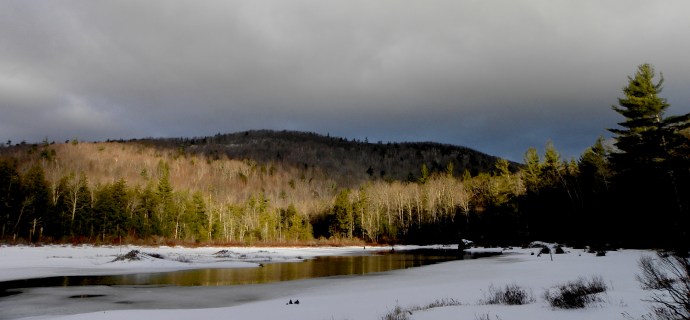
A morning which carries us back beyond the Mosaic creation—where crystallizations are fresh & unmelted. It is the poet’s hour. Mornings when men are new born—men who have the seeds of life in them. It should be part of my religion to abroad then. This is not one of those mornings—but a clear cold airy winter day.
It is surprising how much room there is in nature, —if man will follow his proper path…
in Thoreau’s Journal:
Measure your health by your sympathy with morning and spring. If there is no response in you to the awakening of nature, if the prospect of an early morning walk does not banish sleep, if the warble of the first bluebird does not thrill you, know that the morning and spring of your life are past. Thus may you feel your pulse.

in Thoreau’s Journal:
A fine spring morning. The ground is almost completely bare again. There has been a frost in the night. Now at half past eight it is melted and wets my feet like a dew. The water on the meadow this still bright morning is smooth as in April. I am surprised to hear the strain of a song-sparrow from the river side, thinking of the bluebird, I that instant hear one’s note from deep in the softened air. It is already 40°. By noon it is between 50° and 60°. As the day advances I hear more bluebirds, and see their azure flakes settling on the fence posts. Their short rich warble curls through the air. Its grain now lies parallel to the bluebird’s warble, like boards of the same lot.

It seems to be one of those early springs of which we have heard, but which we have never experienced.
in Thoreau’s Journal:

A man has not seen a thing who has not felt it.
in Thoreau’s Journal:
There is now a crack running down the middle of the river, and it is slightly elevated there, owing, probably, to the increasing temperature.
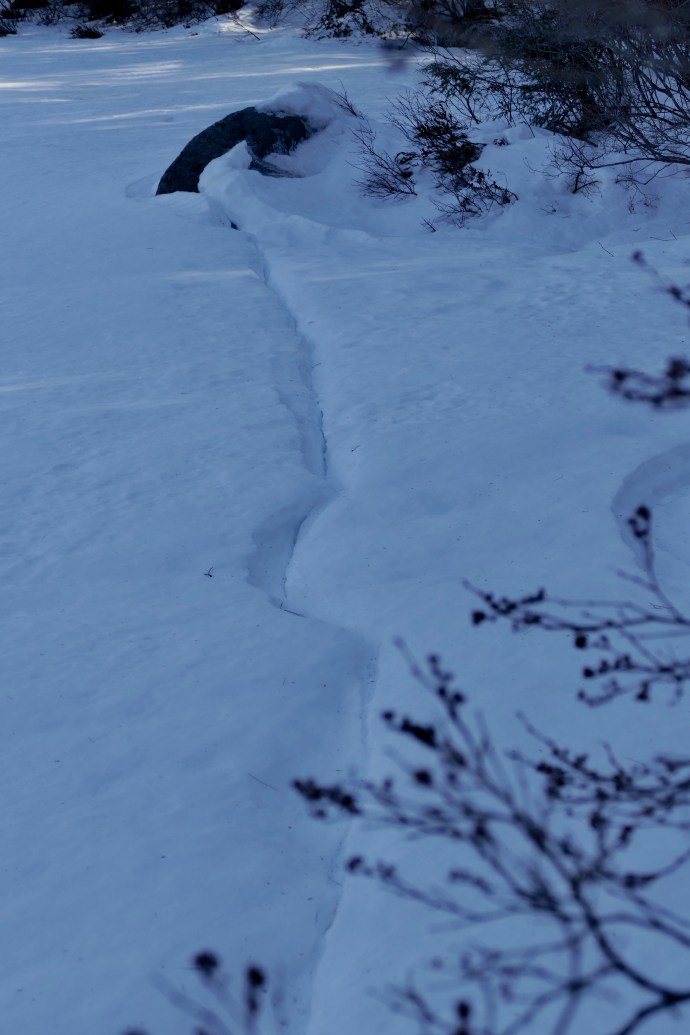
February 21, 2017: Dinsmore Pond, Sandwich, NH
in Thoreau’s Journal:
A little snow lodged on the N side of the woods gives them a hoary aspect—a mere sugaring however— The snow has just ceased falling about 2 inches deep in the woods upon the old….
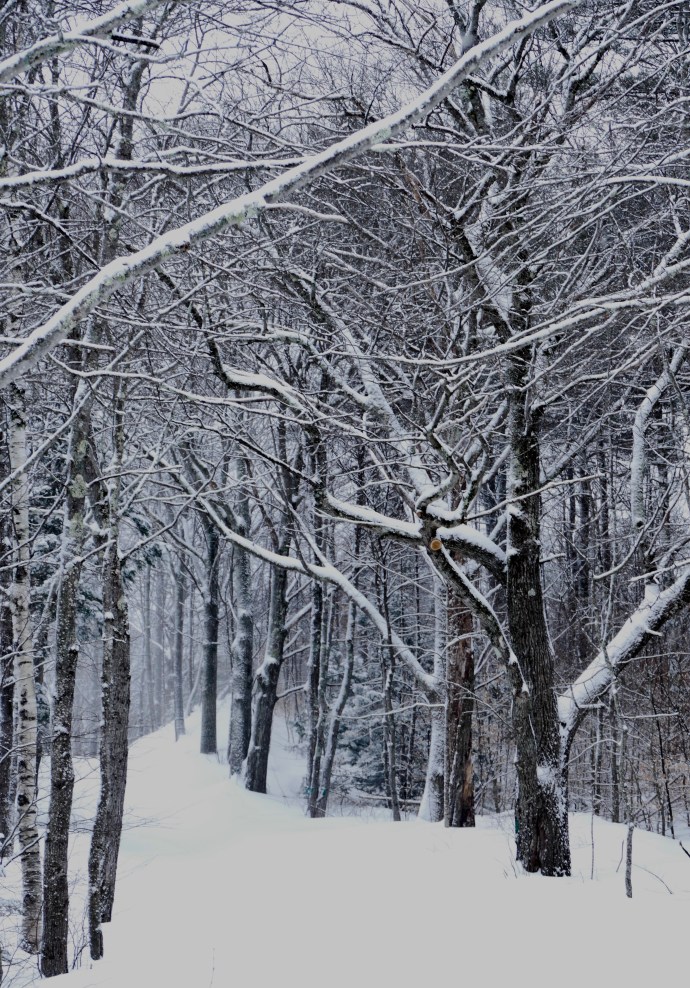
You cannot walk too early in new fallen snow—to get the sense of purity novelty & unexploredness. The snow has lodged more or less in perpendicular lines on the northerly sides of trees so that I am able to tell the points of compass as well as by the sun. I guide myself accordingly.
1854 in Thoreau’s Journal:
Made a fire on the south side of the pond [Fair Haven Pond]. We skated home in the dark—with an odor of smoke in our clothes. It was pleasant to dash over the ice—feeling the inequalities which we could not see—now rising over considerable hillocks for it had settled on the meadows—now descending into corresponding hollows.
We have had but one no more this winter (and that I think was the first) of those gentle moist snows which lodge perfectly on the trees—and make perhaps the most beautiful sight of any.

1842 in Thoreau’s Journal:
The death of friends should inspire us as much as their lives.
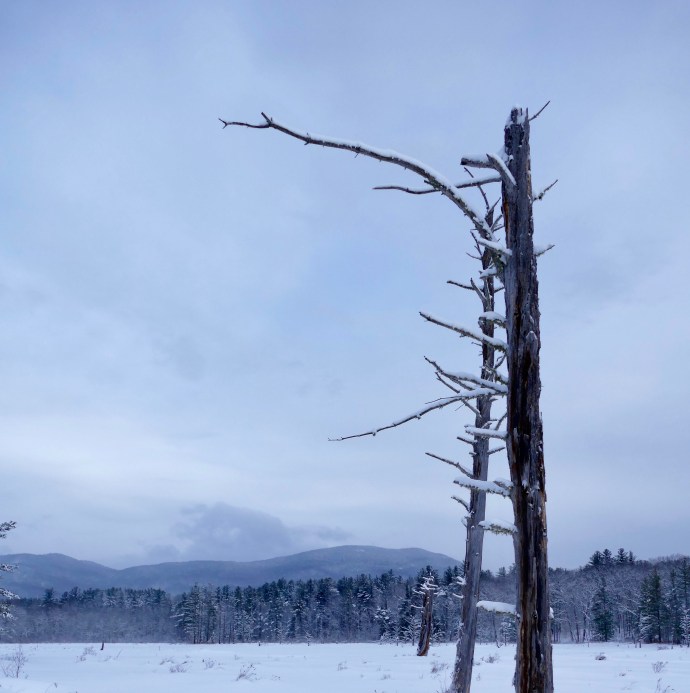
in Thoreau’s Journal:
The sky appears broader now than it did. The day has opened its eyelids wider.

The lengthening of the days, commenced a good while ago, is a kind of forerunner of the spring. Of course it is then that the ameliorating cause begins to work.
in Thoreau’s Journal:
I had not been out long to-day when it seemed that a new spring was already born; not quite weaned, it is true, but verily entered upon existence. Nature struck up “the same old song in the grass,” despite eighteen inches of snow…
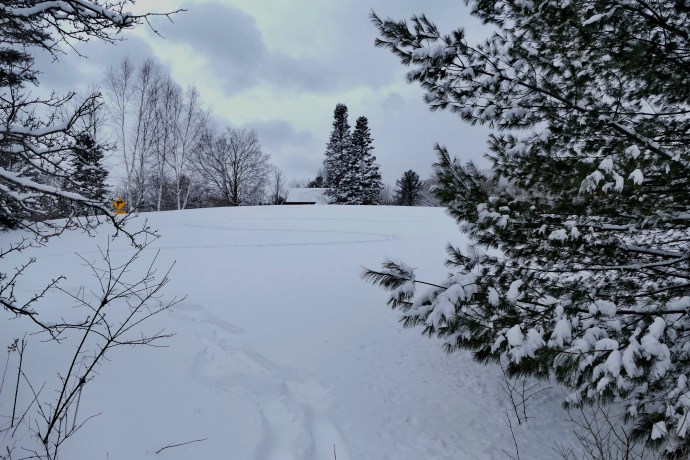
in Thoreau’s Journal:
The mice tracks are very amusing. It is surprising how numerous they are, and yet I rarely see a mouse….Any tussocky ground is scored with them….

You see deep and distinct channels in the snow in some places, as if a whole colony had long traveled to and fro in them, a highway, a well-known trail, but suddenly they will come to an end.
in Thoreau’s Journal:
From the entrance to the mill road, I look back through the sunlight, this soft afternoon, to some white pine tops near Jenny Durgan’s. Their flattish boughs rest stratum above stratum like a cloud, a green mackerel sky, hardly reminding me of the concealed earth so far beneath. They are like a flaky crust of the earth, more ethereal, terebinthine, evergreen earth. It occurs to me that my eyes rest on them with the same pleasure as do those of the hen hawk which has been nestled in them.

My eyes nibble the piny sierra which makes the horizon’s edge as a hungry man nibbles a cracker. The hen hawk and the pine are friends. The same thing which keeps the henhawk in the woods, away from cities, keeps me here. That bird settles with confidence on a white pine top, and not upon your weather-cock. That bird will not be poultry of yours, lays no eggs for you, forever hides its nest. Though WILLED or WILD, it is not willful in its wildness. The unsympathizing man regards the wildness of some animals, their strangeness to him, as a sin as if all their virtue consisted in their tamableness. He has always a charge in his gun ready for their extermination. What we call wildness is a civilization other than our own. The henhawk shuns the farmer, but it seeks the friendly shelter and support of the pine. It will not consent to walk in the barnyard, but it loves to soar above the clouds. It has its own way and is beautiful when we would fain subject it to our will. So any surpassing work of art is strange and wild to the mass of men, as is genius itself. No hawk that soars and steals our poultry is wilder than genius, and none is more persecuted or above persecution. It can never be poet laureate, to say, “Pretty Poll,” and “Polly want a cracker.”
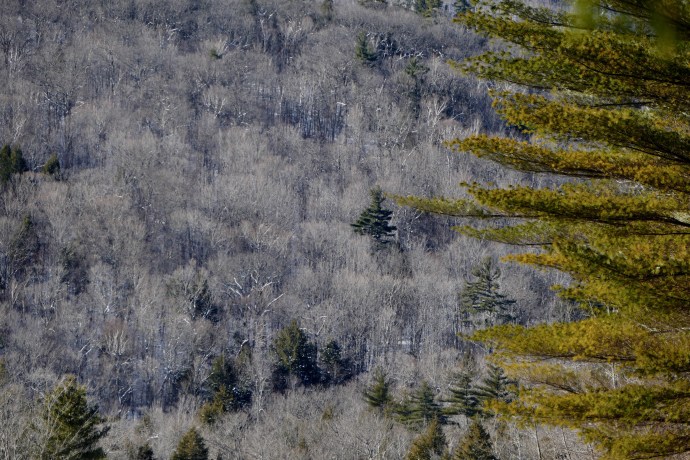
in Thoreau’s Journal:
All day a steady, warm, imprisioning rain, carrying off the snow, not unmusical on my roof It is a rare time for the student and reader who cannot go abroad in the P.M., provided he can keep awake, for we are wont to be drowsy as cats in such weather. Without, it is not walking but wading. It is so long since I have heard it, that the steady rushing, soaking sound of the rain on the shingles is musical. The fire needs no replenishing, and we save our fuel. It seems like a distant forerunner of spring. It is because I am allied to the elements that the sound of the rain is thus soothing to me. This sound sinks into my spirit, as the water into the earth, reminding me of the season when snow and ice will be no more, when the earth will be thawed, and drink up the rain as fast as it falls.

in Thoreau’s Journal:
At the Cliffs the rocks are in some places covered with ice. And the least inclination beyond a perpendicular in their faces is betrayed by the formation of icicles at once which hang perpendicularly—like organ pipes—in front of the rock—

They are now conducting downward the melting ice and snow which drips from their points with a slight clinking & lapsing sound—but when the sun has set will freeze there and add to the icicles’ length. Where the icicles have reached the ground & are like thick pillars they have a sort of annular appearance somewhat like the successive swells on the legs of tables and bed-posts— There is perhaps a harmony between the turner’s taste & the law of nature in this instance. The shadow of the water flowing or pulsating behind the transparent icy crust or these stalactites—in the sun imparts a semblance of life to the whole.

in Thoreau’s Journal:
Winter comes to make walking possible where there was no walking in summer. Not till winter can we take possession of the whole of our territory.…

…The wonderful stillness of a winter day…!
…A transient acquaintance with any phenomenon is not sufficient to make it completely the subject of your muse. You must be so conversant with it as to REMEMBER it, and be reminded of it long afterward, while it lies remotely fair and elysian in the horizon, approachable only by the imagination.

in Thoreau’s Journal:
I find that it is an excellent walk for variety and novelty and wildness to keep round the edge of the meadow. The ice not being strong enough to bear, and transparent as water, on the bare ground or now just between the highest water mark and the present water line is a narrow, meandering walk rich in unexpected views and objects.
The line of rubbish which marks the higher tides, withered flags and seeds and twigs and cranberries, is to my eyes a very agreeable and significant line which nature traces along the edge of the meadows. It is a strongly marked, enduring, natural line which in summer reminds me that the water has once stood over where I walk. Sometimes the grooved trees tell the same tale. The wrecks of the meadow fill a thousand coves, and tell a thousand tales to those who can read them; our prairial, mediterranean shore…
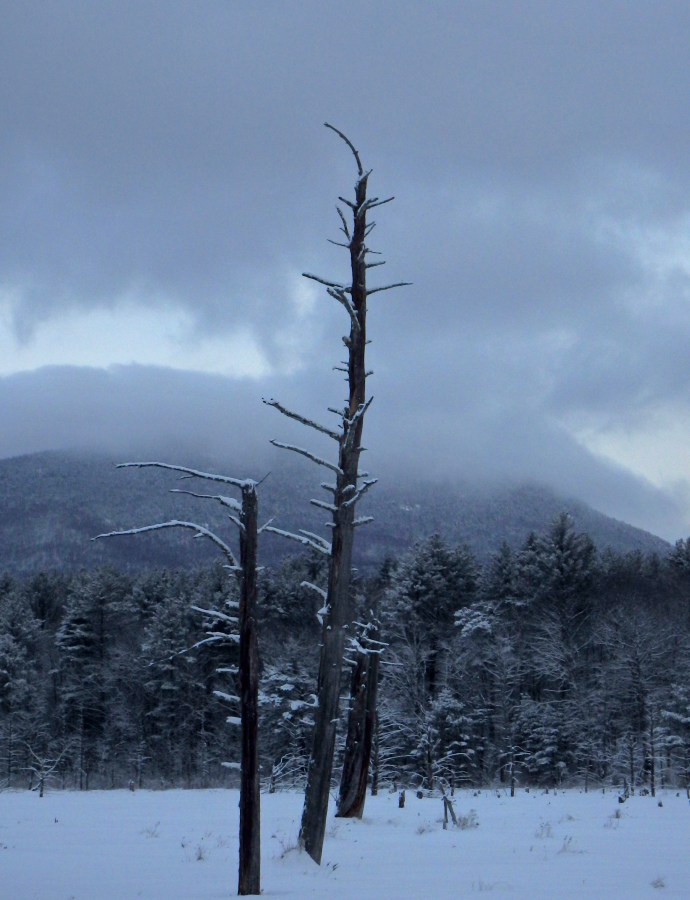
If you cannot go on the ice, you are then gently compelled to take this course, which is, on the whole, more beautiful, to follow the sinuosities of the meadow.

in Thoreau’s Journal:
….Now, as after a freshet in cold weather, the ice which had formed around and frozen to the trees and bushes along the shore, settling, draws them down to the ground or water, after breaking them extensively. It reminds you of an alligator or other evil genius of the river pulling the trees and bushes, which had come to drink, into the water. If a maple or alder is unfortunate enough to slip its lower limbs into the freshet, dallying with it, their fate is sealed, for the water freezing that night takes fast hold of them like a vise, and when the water runs out from beneath an irresistible weight brings them down to the ground and holds them there. Only the spring will soften the heart of the relentless monster when commonly it is too late.

February 10, 2017: Montgomery Brook, Sandwich, New Hampshire
in Thoreau’s Journal:

I do not know of any more exhilarating walking than up or down a broad field of smooth ice like this in a cold, glittering, winter day, when your rubbers give you a firm hold on the ice.
in Thoreau’s Journal:
My life at this moment is like a summer morning when birds are singing.
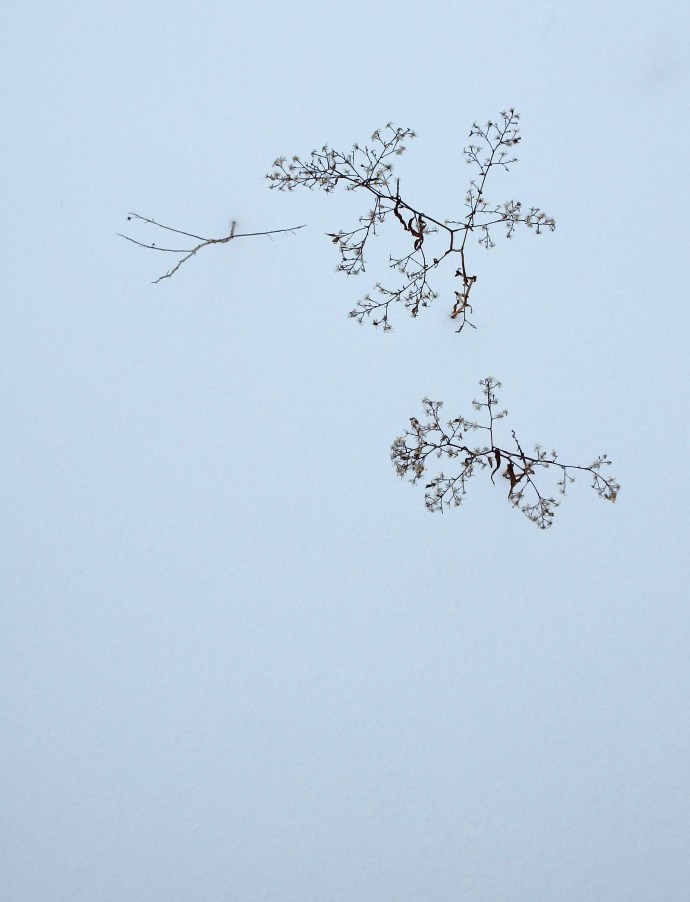
Yet that is false, for nature’s is an idle pleasure in comparison. My hour has a more solid serenity.
You must be logged in to post a comment.